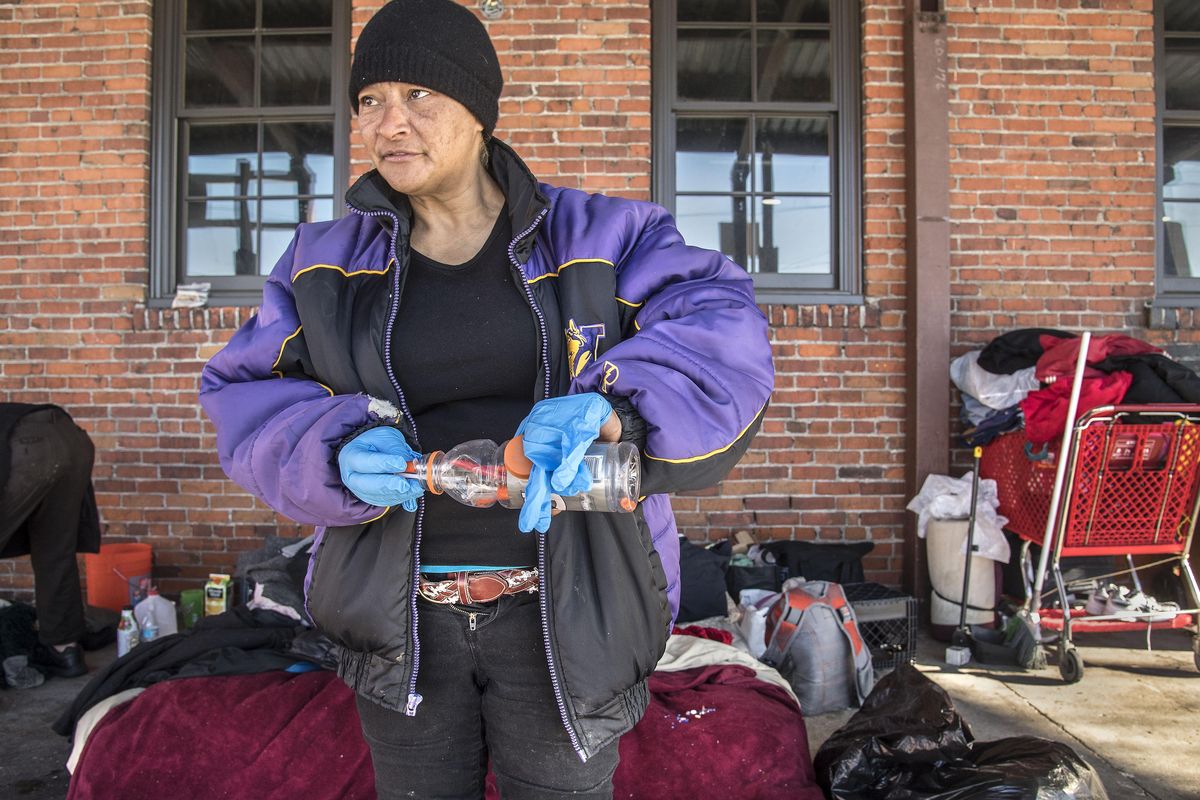Despite House of Charity’s extended hours, a few of Spokane’s homeless prefer sleeping outside

Jonita “Pink” Chavez spends her nights outside sleeping on a mattress beneath a metal awning at Second Avenue and Browne Street.
During the day, she walks around under the nearby Browne Street railroad overpass and picks up the beer cans, food wrappers and other trash people leave around. And she gathers syringes in an empty orange Gatorade bottle.
“It makes me mad,” she said.
About three months ago, the House of Charity began an open-door policy and extended its hours, taking anyone who wants to spend the night, regardless of what time they come in. Pets were welcome, too, so long as they didn’t disturb others. Sam Dompier, the director of the House of Charity, said the goal was to eliminate as many barriers as possible for people seeking shelter.
Chavez is among the few homeless people in Spokane who are still choosing to sleep outside, rather than at the House of Charity.
“I’d rather be out here in my own little bubble,” she said.
House of Charity’s strategy, made possible by extra city and county funding, has largely worked, said Rob McCann, the executive director of Catholic Charities, which runs the shelter. The camps and clusters of blankets under downtown overpasses packed up as people moved inside. Now, 250 to 300 people a night sleep at the House of Charity.
But it led to an unintended side effect. A handful of people who refuse to sleep inside, usually because of chronic drug addiction and mental health issues, found their downtown communities empty. McCann said those people, seeking the companionship of others they knew on the streets, clustered under the Browne Street bridge so they could be close to their friends.
The bridge underpass was a mess until police did a sweep about two weeks ago. Before that, staff from the House of Charity and downtown police officers were going by every day, cleaning up human feces, needles and other trash.
“We’ve had two of our staff get needle sticks as they’re cleaning up people’s gear,” McCann said.
After warning the people camping there that they had to leave, police went in and kicked people out. Dompier said some came inside to get services. Others have scattered.
Chavez doesn’t stay under the bridge, preferring to have her own space. On the street, she goes by “Pink,” her favorite color. Her fingers, black around the edges from frostbite, have a chipped coat of pink nail polish, though her hair is dyed platinum blond.
She’s unfailingly friendly, smiling and joking with the House of Charity staff. But, she said, “It’s hard for me to go inside.”
Some homeless people don’t like her because of her enthusiasm for keeping things clean, which can make being inside the House of Charity stressful. She gets anxious around large groups and doesn’t like the smell of a hundred homeless people clustered together.
Chavez said she uses meth and heroin, though she’s trying to quit. She doesn’t use needles anymore, preferring to smoke. Though her addiction isn’t a reason she stays outside, she says many of the other holdouts are drug users who don’t want to be constrained.
Downtown police Officer Joe Dotson said people staying under the bridge tend to come and go. Fewer people live on the streets in the winter, but he said having the House of Charity open longer hours seems to have reduced the number camping elsewhere, at least a little.
“Everyone was warned and kind of settled at the House of Charity,” he said of the people camping under the bridge.
For House of Charity staff, the last three months have been a learning process. A row of Port-a-Potties sits outside the shelter because the bathrooms are being renovated. A broken hot water heater will be fixed, allowing shelter residents to have a hot shower for the first time in months.
For now, Chavez plans to keep sleeping on her blanket-laden mattress with a man named Spider, who she says is her bodyguard. She’s a mother of five and says her kids are local, but she stays away from them because she doesn’t want to draw them into her addiction.
In her pocket, she has a stash of blue latex gloves. She slips a pair on and keeps picking up the trash other people have left around her mattress.
“My kids could step on that. I just worry about my kids,” she said.